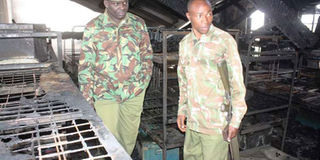Exam inequalities to blame for spate of school fires

This photo dated July 19, 2016 shows police officers in a dormitory at Kiambogo High School in Naivasha that students from the institution had burnt the previous day. PHOTO | MACHARIA MWANGI | NATION MEDIA GROUP
What you need to know:
- The Cabinet Secretary for the Ministry of Education, Science and Technology, Fred Matiang'i, knows that not everyone has a head with corners where extra brains hide, waiting to come out when challenged to report on the results of mixing potassium permanganate with hydrochloric acid.
- Helping oneself during examinations is a continuing struggle to right class and regional inequalities from which students in disadvantaged environments must not be distracted.
More than 90 school dormitories have been set on fire in the past month alone, and it was unlikely because students only wanted to heat up the dropping temperatures in July.
Barely a fortnight after schools reopened after the April recess in May, the government crushed all ball games, inter-school visits, music and drama festivals, mock examinations and prayers into the second term. The decision to ban prayers in the third term was very ill-advised, considering that a government commission had found in 1995 that devil worshipping was rampant in schools.
The decision to ban all prayer sessions for candidates during the third term, when they are expected to confront the forces of evil hidden in national examinations, cannot be allowed to pass without comment from the student community.
The banning of large prayer meetings while extending the length of the second term by a week and shortening the August holiday by a week opened a chink for the devil to turn schools into his workshop. The team of head teachers and police officers appointed to investigate the causes of the ongoing school fires is likely to miss the obvious fact that students are not burning dining halls, classrooms, libraries or playing fields: they are only burning dormitories and the occasional laboratory.
The team of investigators is likely to approach its assignment with the attitude that the students are spoilt brats who are allowed to elect prefects, protected from caning even when they plot with ringleaders to burn school.
Students only want to visit their parents regularly, to be fed on choice meals and pampered a little ahead of terrifying national examinations.
It is obvious that students have a problem with oversleeping in school, hence the targeting of dormitories, where they are required to nurse their homesickness for weeks. Schools have democratised dramatically in the past few years and embraced human rights principles such as outlawing the use of canes. Further, school prefects are elected through universal student suffrage and the body of learners elect a representative to the schools board of management who drinks soda and eats visitor food when there are meetings.
NO RECORD
On the matter of extending the second term, shortening the August holiday, banning visits in the third term and outlawing prayers, there is no record that the Cabinet Secretary (CS) for Education, Science and Technology, Fred Matiang’i, consulted the student body. This is clearly the return of dictatorship that could reintroduce corporal punishment whose use would return the era of teachers beating the backsides of students until they are bruised black and blue.
There is a clear absence of internal democracy and general fairness in school administration, especially in the decision to isolate students from parents, guardians and other well-wishers as well as to deny them spiritual nourishment just because of fears over examination cheating.
Last year alone, cheating in examinations was so careless that over 5,000 students were caught.
No student wants to be surprised by an examination, hence the effort that goes into preparations. Students prepare for examinations by obtaining all the help possible, through social media, WhatsApp and mobile phone text messages to avoid any last minute surprises. Given the preponderance in the theft of elections, public funds and other markers of success, nothing could prepare students for life after school better than navigating the trickery of examinations.
The Cabinet Secretary knows that not everyone has a head with corners where extra brains hide, waiting to come out when challenged to report on the results of mixing potassium permanganate with hydrochloric acid. Helping oneself during examinations is a continuing struggle to right class and regional inequalities from which students in disadvantaged environments must not be distracted.





